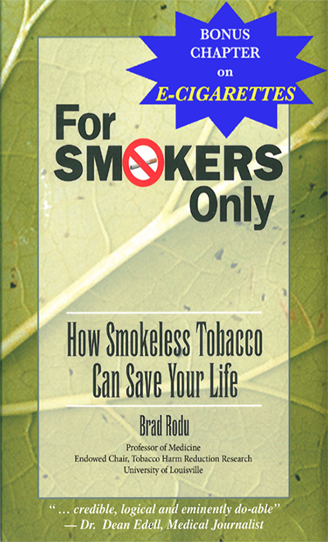The Cincinnati Enquirer published my guest column last week (here), on the occasion of the Great American Smokeout.
The following day, Dr, Nagla Abdel Karim, an assistant professor at the University of Cincinnati College of Medicine, authored a column criticizing the Owensboro Switch and Quit campaign (here). Her piece illustrates the misinformation that dominates discussion of tobacco harm reduction. Dr. Karim’s statements are worthy of further discussion.
Dr. Karim accurately described Switch and Quit as “an advertising campaign encouraging smokers in Kentucky to make the switch to smokeless tobacco… citing a decreased risk for cancer.” But then she makes a demonstrably false statement: “Unfortunately, this simply isn’t true.”
Is it possible that Dr. Karim believes that the cancer risks from smokeless tobacco are the same as those from smoking? A recent study (here) estimated how smokeless tobacco use might have changed cancer deaths in 2005, a year in which 104,737 American men died from cancers directly attributable to smoking. If all smokers had instead used smokeless tobacco, the number would have been 1,102. The risks from smokeless tobacco are so low that, even if ALL American men were users, there would have been only 2,298 cancer deaths, or 2.2% of the number attributable to smoking.
Dr. Karim wrote that smokeless tobacco “users are at a higher risk for gastrointestinal cancers. This isn’t supposition,” she continued, “it’s been scientifically proven through research studies examining the health effects of smoking and smokeless tobacco.”
She is mistaken. A comprehensive meta-analysis (discussed in detail here) found that smokeless tobacco users had the following relative risks (RR, compared with never users):
Esophagus: RR = 1.13 (CI = 0.95-1.36)
Stomach: RR = 1.03 (CI = 0.88-1.20)
Pancreas: RR = 1.07 (CI = 0.71-1.60)
All Digestive Tract: RR = 0.86 (CI = 0.59-1.25)
It is important to emphasize that there are no elevated risks in this list.
Dr. Karim wrote that a 2007 American Cancer Society study showed that smokers “…who had switched to spit tobacco had a higher rate of death from lung cancer, coronary heart disease and stroke than those who quit using tobacco entirely.”
These claims cannot be validated because the Cancer Society refuses to release the underlying data (discussed here). This is contrary to worldwide medical data sharing practices. Since lung cancer, coronary heart disease and stroke are strongly associated with smoking, the data might show that some Cancer Society “switchers” were actually still “smokers”, undercutting the findings.
Finally, Dr. Karim acknowledges how hard it is to achieve abstinence, and she refers smokers to the government’s abstinence-only website (here). On the homepage is a reference to behavioral tips that are supposed to help smokers when they are desperate for a cigarette -- “being active (walking, jogging, exercising, etc.) drinking water, thinking about something else, and making arts and crafts.”
It is unfortunate that health professionals are invested in worthless behavioral tips for one of the most powerful of human addictions. However, I wholeheartedly agree that smokers should start “thinking about something else,” including switching to satisfying and vastly safer cigarette substitutes.
I would welcome the opportunity to debate this important public health issue with Dr. Karim at a University of Cincinnati College of Medicine forum.
Tuesday, November 22, 2011
Tobacco Harm Reduction Debated in the Cincinnati Enquirer
Subscribe to:
Post Comments (Atom)










2 comments:
Thanks Brad, I hope she takes you up on the offer. I'm tired of people whether they are spokesmen or doctors or ALA representatives or whoever making inaccurate and downright false statements when it comes to smokeless alternatives available to Americans. It's downright shameful. I have been off of cigarettes completely for over eleven months now and it's due to electronic cigarettes. I'd still be a smoker if I were unable to begin using e-cigs back then and MY doctor has nothing but praise for me getting off the cigarettes. Doctor Karim better do a little more homework and recognize smokeless alternatives for what they actually are. They are life savers.
The overall hazard ratio in the 2007 study is 1.08. I've never seen a paper published with such a small overall effect. And tobacco use was reported at baseline of a 20-year period, so smokeless tobacco users and non-users may have had different smoking relapse rates. Unfortunately, such follow-up information is not generally available for the CPS-II study group.
Post a Comment